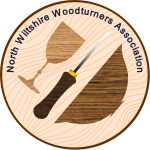Club Night Report
Wednesday 12th June 2024
Club Night Photos for Wednesday 12th June 2024 - Guest Demonstrator: Steve Heeley
The demonstrator for the June 2024 meeting was a welcome return of Steve Heeley, (Website: www.steveheeley.co.uk) who last visited us in August 2022.Tonight's demonstration was the making of an Acorn Box (with a close-fitting lid) in Olive Ash.
NOTE: the first four photos shown below are a display of items made by Steve.
 Steve started by mounting the blank (3 ½" square by 7" long) between
centres, with a Steb drive in the headstock. This was made
round, the
end faced and an accurate spigot to suit the 4-jaw chuck was cut at the
tailstock end. The part was then held in the 4-jaw chuck ('C' type
spigot jaws) - and the same tenon was cut at the tailstock end - and
then cut into 2-pieces with a thin parting tool - leaving the 'base'
part of the box in the chuck. The outside diameter was trued up and the
end faced square. An indent was made in the end face with a spindle
gouge - which served to locate a 3/8" diameter drill - mounted in a
handle - to drill the part to depth, ready for hollowing. Steve used a
spindle gouge to rough hollow the base, and cut a recess for the box lid
in the end. The outside shape of the acorn was rough turned. The inside
of the box was re-worked to get a suitable wall thickness. A scraper was
used to create a final smooth internal surface - then sanded through the
grits.
Steve started by mounting the blank (3 ½" square by 7" long) between
centres, with a Steb drive in the headstock. This was made
round, the
end faced and an accurate spigot to suit the 4-jaw chuck was cut at the
tailstock end. The part was then held in the 4-jaw chuck ('C' type
spigot jaws) - and the same tenon was cut at the tailstock end - and
then cut into 2-pieces with a thin parting tool - leaving the 'base'
part of the box in the chuck. The outside diameter was trued up and the
end faced square. An indent was made in the end face with a spindle
gouge - which served to locate a 3/8" diameter drill - mounted in a
handle - to drill the part to depth, ready for hollowing. Steve used a
spindle gouge to rough hollow the base, and cut a recess for the box lid
in the end. The outside shape of the acorn was rough turned. The inside
of the box was re-worked to get a suitable wall thickness. A scraper was
used to create a final smooth internal surface - then sanded through the
grits.The box lid was mounted in the 4-jaw chuck - the outside diameter was trued and the end faced square. Callipers were used to measure the size of the recess in the base. A spigot was turned to fit the recess in the base - this was created to be slightly curved and 'high' in the centre, giving a tight fit in the base. Steve would typically leave this for a couple of days for the timber to settle, before he made the final adjustment for the desired 'pop-fit'. The box lid was then rough and finish turned, drilled, hollowed and sanded in a similar fashion to the base.
The box lid was textured with a Sorby texturing tool to create the dimpled effect on the acorn cap.
The bottom of the box - located at the tailstock end, was thinned, shaped, parted off and then sanded to complete the turning. Acrylic sanding sealer spray was applied. Steve's own mix of 50/50 beeswax and carnauba wax (cast as a 'stick') was applied as the final finish.
The cap, located at the headstock end was thinned to leave a stem, parted off - and then hand whittled to a slight curve.
To complete his demonstration, Steve showed the basic cuts used in spindle turning - emphasising the position of the feet and the cutting tool at the start of the cut. A pine blank - 2" square by 10" long was mounted between centres and the pommel cut (square to round), vee cuts and planing cuts were shown with the skew chisel, followed by beads and coves with a spindle gouge.
Once again, Steve demonstrated a fine display of skills, precision and techniques to create a different type of box - nicely hollowed, textured and finished with a classic 'pop-off' fitted lid. The finished box was kindly donated to the Club to be used in an auction or raffle for Club funds - as is Steve's usual practice.
A full and entertaining evening - thank you Steve!
 |
 |
 |
 |
 |
 |
 |
 |
 |
 |
 |
 |
 |
 |
 |
 |
 |
 |

|
 |
 |
 |
 |
 |
 |
 |
 |
 |
 |
 |
 |
 |
 |
 |
 |
 |
 |
 |
 |
 |
 |
 |
The Display Table was well supported with some interesting items on display...
Frans Brown showed a large bowl made from Cedar of
Lebanon (which looks very much like yew) - this had been soaked in
alcohol to get the resin out of the timber - which then had 15-coats of
finishing oil applied (one-per-day). Dave
Branscombe presented a number of items to include a lidded pot
with a finial, in ash and walnut and a sphere on a stand. Dave had also
been 'experimenting' with plywood laminated platters and the use of
colour, symmetrical/ geometric patterns and pyrography.
Tim Mortimer showed two wet turned sycamore
bowls - one of which had a spray lacquer applied and the other was
unfinished. Martin Barrett displayed five bowls in
various timbers and designs - to include, spalted sycamore, spalted
beech and sapele.
 |
 |
 |
 |
 |
 |
 |
 |
 |
 |
 |
 |
